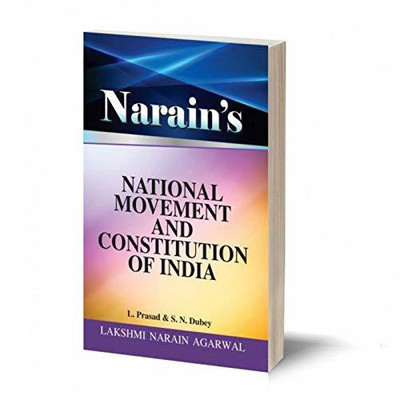Narain's National Movement And Constitution Of India(Paperback, L. Prasad, S.N. Dubey)
Quick Overview
Product Price Comparison
CONTENTS : Chapters Rise and Growth of the British Empire in India Nature of British Rule in India Challenges to British Power : The Revolt of 1857 orThe First War of Indian Independence Some ŌĆśOther Important Revolts after the Revolt of 1857ŌĆś Socio-Religious Movements of the 15th century and their role in national awakening. Growth of political consciousness or concept of nationalism : Its political, economic and social aspects or background Birth of Indian National Congress : Its early aims The Moderates : Their Objectives, Techniques and Achievements The Extremists : Their Objectives, Techniques and Achievements (The Surat Split) The Revolutionary Nationalists The partition of Bengal and the Swadeshi Movement The First World War and Indian Nationalism, The Home Rule Movement : The Lucknow Pact The Advent of Gandhi in Indian Politics : The First Satyagraha Movement. The Khilafat and the Non-cooperation Movement The Swarajya-Party The Bardoli Satyagraha : The Simon Commission : The Nehru Report, The Demand of Dominion Status and Poorna-Swarajya The Civil Disobedience Movement and the Round Table Conferences : Macdonald Award (Communal Award) and the Poona Pact The Second World War and Indian Politics : The Individual Satyagraha; The Quit India Movement: The Indian National Army : The Naval Mutiny : The Mass Movements The Partition of India and Achievement of Independence Muslim Communalism and Partition of India The Indian States and the National Movement The Peasants and Labour Movements Some Leaders of the Indian National Movement Model Objective Questions and their Answers CONSTITUTION OF INDIA Introductory (i) Historical Review (ii) Salient Features of the Constitution (iii) Amendment of the Constitution (iv) Fundamental Rights (v) Fundamental Duties (vi) Directive Principles of State Policy (vii) Main Features of Indian Constitution The Union Executive (i) Election of the President (ii) Powers and Functions of the President (iii) Emergency Powers of the President (iv) Vice President (v) Council of Ministers (vi) The Prime Minister The Parliament (i) Union Legislature (ii) Council of States (iii) House of the People (iv) The Speaker (v) Legislature Procedure (vi) Money Bills (vii) The Budget (viii) Powers of Parliament (ix) Decline of Parliament (x) Delegated Legislation The Union Judiciary (i) Supreme Court (ii) Judicial Review (iii) Judicial Activism in India Union Commission and Administrative Reforms (i) Union Public Service Commission (ii) Finance Commission (iii) Election Commission (iv) Comptroller and Auditor General of India (v) The Attorney General of India (vi) Staff Selection Commission (vii) Official Language of Indian Union (viii) Administrative Reforms and Public Grievances Centre-State Relations (i) Legislative Relations (ii) Administrative Relations (iii) Financial Relations (iv) Recommendations of Sarkaria Commission on Centre-State Relations (v) Special Function of the Governor (vi) Polity in Union Territories (vii) Local Government in Urban India The State Executive (i) The Governor (ii) Council of Ministers of the State The State Legislature (i) Legislative Council (ii) Legislative Assembly (iii) Law Making Procedure in a State (iv) Money Bills (v) The Budget The High Courts (i) Composition The Party System and Election Commission (i) Main Features of Party System (ii) Main Political Parties in India (iii) Pressure Groups (iv) Political Defection (v) Election Commission (vi) Electrol Reforms in India (vii) Amendments to the Constitution Categories: Authors, DR. L. PRASAD, DR. S.N. DUBEY, Political Science, Refresher Course (Question & Answers)


